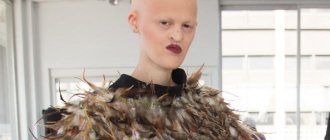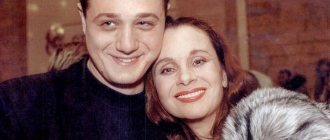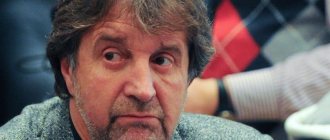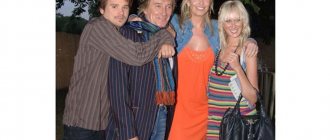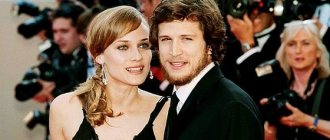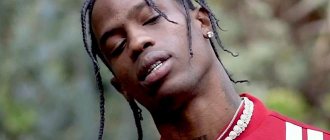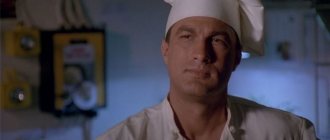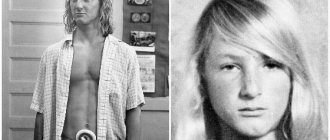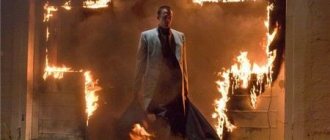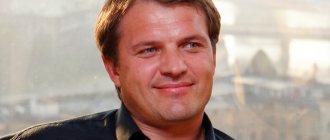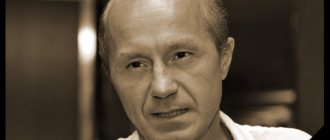June 6, 2019Art, Literature
Creativity and lack of work, world fame and rejection at home, relationships with parents and illness. Andrei Tarkovsky kept diaries for more than 15 years - from April 1970 until his death in 1986. Arzamas selected and commented on excerpts from the film director’s diary
Author Alexander Stognienko
Andrei Tarkovsky called his diary a “martyrology” - a list of suffering. Despite the fact that Tarkovsky is one of the most famous Russian directors, his Martyrology was released in Russian only in 2008 - and not in Russia, but in Italy. The diary was translated into many languages and published in almost all European countries.
About lack of work
“<...> Now I’m not afraid of anything - they won’t let me work - I’ll sit in the village, raise piglets, geese, look after the garden, and I don’t care about them! We will gradually put the house and grounds in order, and there will be a wonderful village house. Stone. The people around will be good. Let's put up the hives. There will be honey. I wish I could get a gas car. Then everything is fine. We need to earn more money now in order to finish the house by the fall. So that you can live here even in winter. 300 km from Moscow - they won’t just wander around like that.”
May 10, 1970 May
Andrei Tarkovsky. Early 1970s © Russian State Archive of Literature and Art
Perhaps, film critic Maya Turovskaya, who called her book about him “7 ½”, most accurately defined Tarkovsky’s creative fate. Despite his rather long directorial career (1956–1986), Tarkovsky made three short films (while a student at VGIK) and seven full-length films. The release of each of them was an event both for the Soviet audience and for European film festivals. At the same time, they all met total resistance in Soviet bureaucratic film circles. Ivan's Childhood, which was a great success and received many international awards (including the Golden Lion), was completed in 1962. Filmed in 1966, “Andrei Rublev” lay on the shelf for four years - until 1971, when it was released with banknotes in limited release. The wide premiere of the restored film took place in 1987. Tarkovsky was in dire need of money and was very nervous. In the USSR it was limited by officials, in the West by market conditions. The last film, “Sacrifice”, after editing, the producers demanded to cut it by 20 minutes. Filming took place in Sweden, so Tarkovsky asked for a screening for Ingmar Bergman to prove the validity of his chosen chronology. As a result, concessions were made to him, but the director was never able to get used to the fact that in the West, even auteur cinema is heavily dependent on the material component.
Brief biography of Andrei Tarkovsky
The genius of cinematography was born on April 4, 1932. The director’s homeland was the village of Zavrazhye, Ivanovo region. The boy's family was creative and famous. Father, Arseny Tarkovsky, was known as a famous poet. The mother came from a noble family of the Dubasovs. She had a higher education as a writer. In 1934, the family moved to Moscow, where in the fall Andrei had a sister, Marina. In 1941, the father went to the front, and the mother and two children returned to Zavrazhye, where they stayed until 1943.
Until 1949, Andrei studied at a comprehensive school. He was seriously interested in music and art. In 1951 he entered the Institute of Oriental Studies of the Russian Academy of Sciences at the Arabic Faculty. However, in 1952 he left the university and got a job as a collector on an expedition to the Krasnoyarsk Territory, where he wandered through the taiga for a year. After returning to Moscow, in 1954, he decided to enroll in the directing department at VGIK. He studied in the group of Mikhail Romm.
Work in the USSR
Tarkovsky’s debut work was the film “The Killers” (1956). At VGIK I met Andrei Konchalovsky and together with him wrote scripts for films:
- “Antarctica is a distant country”;
- "Skating rink and violin."
In 1962 he directed the film “Ivan’s Childhood,” for which he received a prize at the Venice Film Festival. Over the next 17 years he made 4 more cult films:
- "Andrey Rublev";
- "Mirror";
- "Solaris";
- "Stalker"
Over these years, Tarkovsky experienced the full power of Soviet censorship. He was harassed and his films were criticized. In France, people stood in line for 2 weeks for tickets for the film “Mirror”. And in the USSR the painting was hidden “on a shelf.” He endured all this painfully.
Quote: “The purpose of art is to prepare a person for death, to plow and loosen his soul, to make it capable of turning to good” (Andrei Tarkovsky. “Imprinted Time”)
Fig.3 Tarkovsky on the set
Life in exile
In 1980, Tarkovsky received an offer to shoot the film “Nostalgia”. The customer was Italian cinema. Andrei agreed and together with his wife went on a business trip to Italy. Work on the film lasted 3 years. During this time, material was accumulated for the documentary film “Time of Travel,” which was released in 1982.
After a long stay abroad, the couple decided not to return to the USSR. In 1986, Andrei Tarkovsky presented a new film, “Sacrifice,” filmed in Sweden. The film is dedicated to nuclear war. The day after the premiere, the 4th power unit exploded in Chernobyl. Society rated the picture as a prediction.
A little earlier, 6 years ago, in the film “Stalker” Tarkovsky also predicted a nuclear post-apocalypse. And to one of the decorations of “Stalker” he added a calendar with a mark of December 28, which will be the last day of his life. He had such prophetic properties.
Rice. 4 Work on the film “Sacrifice”
Friends, acquaintances
Tarkovsky had been friends with Andrei Konchalovsky since his student years. But gradually their views and paths diverged. All the film studio workers lived in the Mosfilm house, where the Tarkovsky family lived, which greatly irritated Andrei. He tried to retire to a private house in the village of Myasnoye.
After the director’s death, many declared their former friendship with him. But Konchalovsky claims that Andrei tried to avoid acquaintances. He was a genius, and he needed only one thing from people - constant admiration. Of course, Andrei had supporters and friends, such as: Vyacheslav Shmyrov, Marlen Khutsiev, Vasily Shukshin, Pyotr Todorovsky, Evgeniy Tashkov, Andrei Eshpai and others.
Personal life
Tarkovsky was married twice. First wife Irma Raush, classmate of Andrei Arsenievich. The marriage produced a son, Arseny, named after his grandfather. He graduated from medical university and works as a doctor. The second marriage took place with Larisa Kizilova, an assistant on the film crew in the film “Andrei Rublev”. The marriage produced a son, Andrei. Currently he lives in France and heads the Tarkovsky Foundation.
At the same time, the director was in love and novels accompanied him throughout his life. Among the favorites: Valentina Malyavina, Margarita Terekhova, Natalya Bondarchuk, Donatella Ballivo and others. The last muse was Inger Persson, costume designer on the set of the film “Sacrifice.” As a result of the affair, a boy, Alexander, was born. He now lives in Norway. Andrei Tarkovsky never saw him.
Video. A film about Andrei Tarkovsky from the series “How the Idols Left” was released on the DTV channel in 2020.
About children and honor
“What will our children be like? A lot depends on us. But also from themselves. It is necessary that the desire for freedom lives in them. It depends on us too. It is difficult for people born into slavery to wean themselves from it. On the one hand, I want the next generation to find at least some peace, but on the other hand, peace is a dangerous thing... The most important thing is to instill dignity and a sense of honor in children.”
September 7, 1970
Filming of the film "Mirror". 1975 © IMDb
The idea of connecting the future with the present one way or another runs through all of Tarkovsky’s films. For example, in “The Mirror” Tarkovsky presented three stages of life and three generations of his own family. It is interesting that in some episodes representatives of different generations were played by the same actor: thus the director, on the one hand, hinted at the similarity of the destinies of different generations, and on the other, that one generation adopts the ideas of another. In real life, the director had three sons: two from different marriages and one more, who was born in Sweden shortly before his father’s death.
about “mirror” and other films in detail
Andrei Tarkovsky: how to start watching his films
We understand the filmography of the great director
Andrey's house
“I often dream about the house of my childhood,” this is how the hero of the film “Mirror” begins his confession. To find his lost childhood, Tarkovsky returned to his homeland, but he never found anything...
From light to shadow
The right to be the birthplace of the great film director Andrei Tarkovsky has been disputed for several years now by two regions - Ivanovo and Kostroma. Recently, the score in this dispute became equal, and historical justice triumphed: following the already existing museum in Yuryevets, they opened their own museum in Zavrazhye, near Kostroma.
The primary source of disagreement was Andrei Arsenievich himself. With his own hand, he brought confusion into official documents, and later the same confusion took root in the minds of admirers of his talent. In various documents, he called the place of his birth either the village of Zavrazhye or the city of Yuryevets - fortunately, both settlements were located almost opposite each other, across the Volga. In addition, before the appearance of the Gorky Reservoir, both of them belonged to the Ivanovo region. Why did this happen?
“Andrei actually sometimes indicated Yuryevets as his place of birth, although he was still born in Zavrazhye, where he lived with his parents for the first six months,” Andrei Arsenievich’s sister Marina recalled at the opening of the museum. – And in Yuryevets he spent most of his conscious childhood. Yuryevets probably pointed out to make it clearer: although small, it is still a city. It was strange and difficult to see in the certificate of his death, issued to us at the city hall of the Parisian suburb of Neuilly-sur-Seine: “Born on April 4, 1932 in Ivanovskaya.” That's all. In some incomprehensible Ivanovo...
Andrei Tarkovsky was born in Zavrazhye, where Andrei’s mother, Maria Ivanovna Tarkovskaya, came at the insistence of her mother. Maria Ivanovna’s stepfather, Nikolai Matveevich Petrov, worked here as a paramedic, and at the family council it was decided that it was better to give birth under the supervision of a loved one, who was also famous as an excellent specialist.
And now it takes five hours to travel by bus from Kostroma to Zavrazhye, but back then it took much more time. In the first days of April 1932, the expectant mother in labor spent several days traveling from the station by way of transport. First along the banks of the Volga, and then just like that, the river was ready to free itself from its icy shackles. The hassle of the road immediately made itself felt: the woman in labor had time before the ice drifted, but she didn’t have time to get to the hospital. So they had to give birth in a village hut right on the dining table. The newborn's grandmother was so alarmed that she even forgot where the midwife lived. Although in the end everything was resolved successfully.
“The diaries kept by mother and father in turn after the birth of their first child have been preserved,” recalls Marina Tarkovskaya. “The father then wrote: “In Zavrazhye, on the night of the fourth of April, from Sunday to Monday, a son was born... On the fifth he was registered, named Andrey and received a “passport.” The eyes are dark, grayish-blue, bluish-gray, grayish-green, narrow, similar to a young Tatar and a lynx. He looks angry. The nose is like mine, but it’s hard to understand, it’s capped. The mouth is beautiful, good.”
Closed door to childhood
...The road to Zavrazhye is really not close. Five hours by bus from Kostroma seemed to provide an opportunity to prepare for a meeting, even if timeless, with the great master Andrei Tarkovsky. He also made his presence known at the opening of the museum. Frames of Solaris flashed in the sky - cold purple clouds and the bright sun quickly gave way to landscapes in some cosmic tones. And another evidence of the invisible presence of the great director appeared to the guests of the holiday a little later - a butterfly, a constant heroine of the poems of Andrei's father, Arseny Tarkovsky, fluttering - this is at the very end of October! - among the yellowed foliage and as if blessing the opening of the museum on their behalf.
...Childhood was hidden from Tarkovsky not only under the thickness of time, but also under water. The part of Zavrazhye where he was born was flooded by the Gorky Reservoir. About a hundred villages, churches, and cemeteries disappeared under the thickness of the water, which spread over many tens of kilometers.
So Zavrazhye, although it has survived as a populated area, has risen much higher from its previous location. Big water has conquered an area of several miles here. Now the Volga splashes right next to the walls of the Church of the Blessed Virgin Mary, in which Andrei Arsenievich was baptized.
Tarkovsky's house - like many other houses in which the film director later lived - miraculously survived. Although the very place where he stood has long been at the bottom.
During the years of flooding, it was decided to raise the second floor of their solid mansion, which belonged to the local factory owner Kudryashov in pre-revolutionary times: it was a pity to leave good wood to the water. Later, a boarding school lived here, until the “pedigree” of the house was accidentally discovered.
The Tarkovskys themselves, six months after the birth of Andryusha, or Ryska, as the adults called him, left Zavrazhye. Ahead was Moscow, which, however, was soon changed to Yuryevets.
Andrei Arsenievich constantly addressed the theme of family and homeland in his work. This is one of his favorite storylines in many films. Although in real life the attempt to return to their previous places only caused disappointment. The world of childhood was irretrievably lost.
– Andrey constantly returned to the topic of home and family. He returned to the banks of the Volga when he was looking for a location for “Mirror,” a largely autobiographical film,” says Marina Arsenyevna. “However, the Big Volga changed everything irrevocably. Even Yuryevets, which, thanks to the dam built around it, at least partially preserved the appearance of a Volga city, was not the same. “My homeland has gone under water,” said the brother.
It is no coincidence that in the script for “Mirrors” there is an episode where a child is looking for his home. He swims underwater, suddenly stumbles upon a door, but still cannot open it...
Florensky is also ours
Local residents did not suspect that a great director was born in their village for many years. Until the early nineties. And, as it turned out at the same time, few people watched his films, and if there were any, even fewer accepted Andrei Arsenievich’s creations.
“Seventy years ago, no one realized that the great Andrei Tarkovsky was born,” marvels local resident and “part-time” most persistent admirer of Tarkovsky’s talent, teacher of Russian language and literature, Galina Golubeva. - Someone was born to the Petrovs. That's all.
The first time Tarkovsky was remembered here was on June 14, 1992, when the actors who worked with him and other guests arrived. It was then that the former chairman of the local village council, Nikolai Petrovich Afonin, certified the ownership of the house where the great film director was born. The idea to open a museum there was born naturally.
The ceremonial cutting of the ribbon was preceded by almost a whole decade of searching for funds, which were found only thanks to the tenacity of local enthusiasts. The original idea to open the museum two years ago, on the master’s seventieth birthday, alas, remained on paper.
Now the name of Tarkovsky is firmly rooted in his homeland. Every day of his birth - the fourth of April - is celebrated, albeit modestly. Gala evening, themed lessons at a local school...
By the opening of the museum, all the locals, including even eyewitnesses of the days when the film director was born, had become seriously skilled in knowing the genealogy of the great fellow countryman. Although in conversations the grannies simply complained about the difficult life of today, they all agreed on the need for a museum. They innocently admitted that they had not watched Tarkovsky’s films, and immediately made the reservation: “Since our fellow countryman became famous, there should be a memory of him.”
Among the museum exhibits is the very dining table on which Andrei Arsenievich Tarkovsky appeared to the world. There is also a genuine certificate of his birth, written by the hand of the same midwife, who was lost at the wrong time. Many meters of Mosfilm film containing footage from Andrei Arsenievich’s films. Tarkovsky's photographs are from childhood and later. The first tour of the museum was conducted by the film director’s sister, Marina Arsenyevna Tarkovskaya.
...During the preparation of the exhibition dedicated to the film director, it suddenly became clear that Zavrazhye was the place of residence and work of the ancestors of the famous philosopher and scientist of the last century, Pavel Florensky. And he himself came here to thoroughly study his ancestry. One of his students even resorted to sacrilege: in order to preserve his grandfather’s flourish for the teacher, he tore out a page from an ancient church book...
The local residents thought and decided: we will dedicate the second hall of the museum to Pavel Alexandrovich - he is also a fellow countryman, we should not forget. The local residents themselves attribute such a high “density” of talent in one small village to the influence of the Volga expanses. And they try to preserve the memory of their great compatriots.
About parents
“<…> I haven’t seen my father for a long time. The more I don’t see him, the sadder and scarier it becomes to go to him. I have obvious complexes regarding my parents. I don't feel like an adult around them. And they, in my opinion, do not consider me an adult. Some painful, complex, unspoken relationships. It's somehow not easy. I love them very much, but I have never felt at ease and on an equal footing with them. In my opinion, they are also ashamed of me, although they love me.”
September 14, 1970
Arseny and Andrei Tarkovsky. 1930s Biographical Encyclopedia “Personalities”
Tarkovsky had a complex and rather cool relationship with his parents, and the film “Mirror” is dedicated to this. Their father, the poet Arseny Tarkovsky, left the family in 1937, leaving Andrei and his sister Marina in the care of their mother Maria Ivanovna Vishnyakova, who devoted herself entirely to the children. Tarkovsky himself was married twice. His first wife, Irma Rausch, played in “Ivan’s Childhood” and “Andrei Rublev.” The second wife, Larisa Kizilova, can be seen in “Mirror”; In addition, she was the second director on the filming of Tarkovsky's subsequent films.
Personal life
Irma Rausch as the Little Fool in Andrei Tarkovsky's feature film "Andrei Rublev" (1966)
Andrei Tarkovsky and actress Larisa Kizilova. Photo: diddlybop.ru
Andrei Tarkovsky and actress Natalya Bondarchuk on the set of Andrei Tarkovsky's feature film "Solaris". Photo: Vladimir Murashko / Cinema Museum, Moscow
Andrei Tarkovsky was married twice. The director's first wife was Irma Rausch. She studied with Tarkovsky at VGIK. Rausch recalled: “Andrei immediately began to look after me, and if he was freed earlier, he would wait for me, and then accompany me to the hostel... I got home late at night. In general, Andrei really scared me with the seriousness of the relationship and his intentions.” In their third year they got married, and soon their son Arseny was born - he was named after Tarkovsky's father.
Irma Rausch starred in “Andrei Rublev”: she played the Little Fool. Famous actresses auditioned for this role: Nina Urgant and Zhanna Bolotova, but Tarkovsky saw her in the film. While working on the film, the director met Larisa Kizilova. She was his assistant. An affair began between them. Andrei Tarkovsky said: “I don’t feel happy when I love a woman. I feel shocked."
In 1970, Tarkovsky's marriage to Irma Rausch broke up. A few months later, the director married Larisa Kizilova. The couple had a son, Andrei. Kizilova also starred in her husband’s film: she played the mistress of a farm in the autobiographical film “Mirror.”
Andrei Tarkovsky often fell in love with the actresses he starred in his films. He had relationships with Natalya Bondarchuk and Margarita Terekhova.
About smoking
“So, it’s worth remembering - on November 12, 1970, I quit smoking. Honestly, it's long overdue. For the last few weeks my soul has been somewhat empty and dull. Either from illness, or because I feel at a dead end. You'll just die and you won't do anything. And how much do you want to do..."
November 15, 1970
Andrei Tarkovsky (right) and Andrei Konchalovsky discuss the script for the film “Ivan’s Childhood.” 1962 © filmz.ru
At the very end of 1985, during the filming of “Sacrifice”, which took place in Sweden, Tarkovsky was diagnosed with lung cancer. Translator Leila Alexander-Garrett, who accompanied the director, describes the doctor’s visit this way: “After passing all the tests, we were invited to the doctor’s office. The results were on the table, and a new X-ray hung on the wall. The doctor is extremely surprised that Tarkovsky quit smoking more than ten years ago. Usually after such a period the lungs clear, but he was unlucky - it’s a lottery...”
About Solzhenitsyn
“Now there is a lot of noise about Solzhenitsyn. The Nobel Prize that was awarded to him confused everyone. He's a good writer. And above all, a citizen. He is somewhat embittered, which is quite understandable if you judge him as a person, and which is more difficult to understand if you consider him primarily a writer. His best work is “Matrenin’s Dvor”. But his personality is heroic. Noble and stoic. His existence gives meaning to my life too.”
November 17, 1970
Andrei Tarkovsky on the set of the film "Nostalgia". 1983 © IMDb
Tarkovsky was never a dissident, although his vision of the world was alien to the ossified Soviet reality. Despite accusations of “elitism” and “separation from the Soviet audience,” he never opposed himself to the Soviet system and did not consider himself a fighter against the regime. However, after the announcement of his non-return to his homeland, made at a press conference in Italy in 1984, Tarkovsky and his films finally became undesirable to the Soviet authorities.
Gossipnik calendar: the work of Andrei Tarkovsky
Today Christians celebrate Easter, so congratulations to those who care about this holiday!
On this day, a personal celebration will certainly be held by birthday boy Robert Downey Jr. And on the fourth of April, Heath Ledger could have turned 31 years old. We talked about Heath and Robert last year, so we'll have a different character this year.
On April 4, 1932, Andrei Arsenievich Tarkovsky was born in the village of Zavrazhye, Yuryevets district, Ivanovo region. He was born into a literary family. His father Arseny Alexandrovich was a poet and translator. Maria Ivanovna’s mother had a literary education, she wrote prose, but she destroyed all her works herself, writing later in her diary that the reason for this was “lack of talent.”
In 1935, Arseny Alexandrovich left his family, and in 1941 he went to the front, where he was seriously wounded, causing him to lose his leg. After breaking up with her husband, Maria Ivanovna got a job in a Moscow printing house. And Andrei Arsenievich began studying at the capital’s school in 1939. However, with the beginning of the war, Andrei’s mother took Andrei and his younger sister to Yuryevets, but already in 1943 they returned to Moscow. Although Andrei Arsenievich always perceived the Ivanovo region as his homeland, which can easily be seen in his work.
According to Tarkovsky, his childhood was not easy. He missed his father, but at the same time, for everything he had, he thanked his mother all his life.
In addition to secondary school, Andrei Arsenievich studied at music school and also studied painting. But his first profession was not related to art. He studied at the Moscow Institute of Oriental Studies in the Arabic department. Tarkovsky later admitted that he made his choice of profession too hastily, and that at that time he did not know enough about life to make such serious decisions.
In 1953, Andrei Arsenievich got a job at the All-Russian Research Institute of Non-Ferrous Metals and Gold and in May of the same year went on an expedition for almost a year in the Turukhansk region of the Krasnoyarsk Territory. And it was this unusual experience, in his own words, that ultimately shaped the decision to become a director.
Upon returning from the expedition, Tarkovsky submitted documents to VGIK and successfully entered the course of the legendary Mikhail Romm.
Romm was a real teacher for his students. Even though he was a socialist realist in his work, he gave his students creative freedom and nurtured individuality. Moreover, he helped future directors a lot - they say, even to the point of lending money.
Tarkovsky began filming in 1957. His first short film was the drama “No Layoffs Today.” This is a very tense picture. The plot in brief is this: during excavation work, utility workers discovered a warehouse of German ammunition - 30 tons of explosives. It is too dangerous to clear it, and it is also impossible to blow it up, since there are residential buildings all around. It was decided to call a special team. And the next day, after the residents of nearby neighborhoods had been evacuated, seven people began their little war, in which one extra movement could lead to disaster.
On his student films, Tarkovsky worked in collaboration with Alexander Gordon (except for ConKillers, which was highly praised by Mikhail Romm, he was helped not only by Gordon, but also by Marika Beiku. This is a short film based on a story by Ernest Hemingway.
"The killers"
As a third-year student, Andrei Arsenievich met first-year student Andrei Konchalovsky. Thus began their friendship and collaboration. Looking ahead, we will say that Konchalovsky more than once helped Tarkovsky, primarily in screenwriting work.
Their first joint project was Trakovsky’s thesis “The Rink and the Violin” - about the friendship of a boy violinist and the driver of the skating rink. In 1961, she received a prize at the New York Student Film Festival. The filming of this film was Tarkovsky’s first collaboration with another of his associates, cameraman Vadim Yusov.
In 1962, Andrei Arsenievich shot his first “big” feature film, “Ivan’s Childhood.” The film has a rather interesting history - initially, the film based on the work of Vladimir Bogomolov was supposed to be shot by director Eduard Abalov with another team. However, at some intermediate stage, the artistic council decided that the film was weak and there was no need to make it at all. It was then that Tarkovsky appeared and proposed to make a movie in a short time, but with different actors, a different group and a different concept. Only the script remained the same, but even Andrei Arsenievich reworked it together with Konchalovsky. In particular, Tarkovsky's real dreams were included in the script. In addition, Andrei Arsenievich managed to “quote” his own father and his poem “Ivan’s Willow” in the film, creating visual images similar to poetic ones.
The film became a worldwide sensation, receiving the Golden Lion at the Venice Film Festival. Jean-Paul Sartre was inspired by him to write an essay. And Jim Jarmusch, more than 30 years later, included an allusion to this film in his “Dead Man”.
"Ivan's childhood"
Over the next four years, Tarkovsky worked on a film that is considered perhaps the most significant in his life, if only because it is admired even by those who do not accept the rest of Andrei Arsenievich’s work (however, there are also people here who call this picture “Russophobic "). This is the film “Andrei Rublev”. The whole world is familiar with this name and it was under this name that the film was released at the box office, but initially it had a different name - “The Passion of Andrei.” Nowadays this is what they call the director’s full version of the film, while everyone knows the traditional release version as “Andrei Rublev.”
This picture is Tarkovsky’s view of Russian history, power, and the church; and, as a result, a reflection on the fate of the artist in this country. The look is unconventional and new. His film is extremely “realistic” - it gives the impression of a chronicle. Andrei Arsenievich generally advocated maximum realism, even down to the absence of makeup. In cinema, in his opinion, everything should be real, and everything should be visible - even the cracks on the wall.
The director's cut of the film is 205 minutes, but it was significantly cut at the box office. By the way, the film was released on Soviet screens in 1971. But back in 1969, the film was shown in Cannes, where it received a prize from the International Association of Film Critics (FIPRESCI).
"Andrey Rublev"
"Andrey Rublev"
"Andrey Rublev"
“Andrei Rublev” became a borderline picture of Tarkovsky’s entire work, a kind of transition from early work to later work - more figurative and, as many critics believe, much less understandable to a wide audience. However, Tarkovsky was never a director for the mass audience.
After finishing work on Andrei Rublev, Tarkovsky began writing a script called Confession. Subsequently, it was renamed more than once (there was also the name “White Day” - based on a poem by Arseny Tarkovsky in 1942), receiving the final name “Mirror”. However, this film was not the next in the work of Andrei Arsenievich.
In 1969, he began writing a script based on Stanislaw Lem's novel Solaris, and already in 1970 he began filming the film. Tarkovsky and Lem had many disagreements in the interpretation of the novel. Andrei Arsenievich’s film is rather not about the unknown that awaits us in space (that’s what Lem used to talk about a lot), but about the need to remain human in any conditions. These words even appear in the film:
Human needs human.
In 1972, work on the film was completed, and Andrei Arsenievich took the film to Cannes. There he received the Grand Jury Prize and the Prize of the Critics' Association (FIPRESCI).
"Solaris"
"Solaris"
"Solaris"
The next year, Tarkovsky took up an autobiographical film, the script for which he had been writing for quite some time - the shooting of “Mirror” began. This is Tarkovsky’s most metaphorical work about himself. With it, he not only told his own story, but also indicated his creative independence - this is what critics saw in the episode where a boy is being treated for a stutter. The words “I can speak” refer primarily to the director himself.
According to a survey by the International Association of Film Critics (FIPRESCI), “Mirror” is one of the hundred best films in the history of cinema.
"Mirror"
"Mirror"
"Mirror"
In 1977, Andrei Arsenievich returned to science fiction (or rather, to his own interpretations). Based on a script co-written with Arkady and Boris Strugatsky, he began filming the film “Stalker” based on the work of the famous science fiction writers “Roadside Picnic”. As is his custom, Tarkovsky moved very far away from the literary version - he has a completely different story and different accents than in the story.
"Stalker" became not just a great work of cinema. For its creators it even had somewhat fatal overtones. A piece of paper with the date December 28 appears twice in the film. The director could not explain to anyone what this date was and why this episode was needed. The day of Tarkovsky's death is December 29. Three members of the Stalker film crew died from the same terrible disease - cancer. This is Tarkovsky himself, his wife Larisa (she was the second director) and actor Anatoly Solonitsyn.
"Stalker" was shown in Cannes. At the festival he received the ecumenical jury prize.
"Stalker"
"Stalker"
In 1980, Andrei Arsenievich went to Italy. There, together with Tonino Guerra, he wrote the script for his next film, Nostalgia. In 1982, having returned to this country, Tarkovsky created the documentary television film “Time of Travel” and began filming “Nostalgia.”
"Nostalgia" is an almost perfect film from a visual point of view. Each frame seems like a frozen photograph, not visually overloaded, but rather even ascetic. The musical accompaniment of the film is also delightful - Debussy, Verdi, Wagner. And the cast is magnificent - Oleg Ivanovich Yankovsky played the main role.
The film tells about a Russian writer traveling through Italy. He is accompanied by a translator who is interested in the poems of Arseny Tarkovsky (it must be said that in his late work Andrei Arsenievich directly refers to the works of his father - his poems are heard, for example, in “Mirror”). The writer is working on a biography of his compatriot, a serf composer who escaped to these places. Over time, the author finds parallels between himself and the hero: both of them felt like strangers in these places, both suffered from this. The writer's homesickness developed into a fatal illness.
"Nostalgia"
"Nostalgia"
Oleg Yankovsky and Andrei Tarkovsky on the set
“Nostalgia” received the FIPRESCI Prize and the Ecumenical Jury Prize in Cannes. Tarkovsky himself was finally recognized as the best director.
Having completed filming of Nostalgia, Tarkovsky began the script for his next film, Sacrifice. The year was 1983.
On July 10, 1984, at a press conference, Andrei Arsenievich announced that he would remain in Europe. The Soviet authorities did not give the director permission to continue his stay abroad, and he decided not to return from the USSR.
Tarkovsky filmed “The Sacrifice” without any participation from the Soviet Union - the film was staged in Sweden, with European actors and crew.
“Sacrifice” is the last film by Andrei Tarkovsky. Probably, the director somehow felt that this film could become his “final word” in art. In any case, it is in it that the result of Tarkovsky’s philosophical quests is supposedly summed up. With this picture, Andrei Arsenievich answered the question, what lengths is a person willing to go to in order to prevent a catastrophe? What kind of catastrophe is not important. The very feeling of something terrible and inevitable is important.
The filming of “Sacrifice” was not without incident. The scene where the main character burns down the house had to be re-shot. The first time the house was burned “in vain” - due to problems with the camera, nothing was recorded on film. The second time, the team was more prudent and filmed with three cameras.
"Sacrifice"
"Sacrifice"
"Sacrifice"
"Sacrifice" won four prizes at the Cannes Film Festival, including the Grand Jury Prize. And the British Film Academy recognized the film as the best film in a foreign language.
In addition to cinema, Tarkovsky did a little theater - he staged Hamlet at Lenkom. In addition, the opera Boris Godunov was performed in Covent Garden under his direction.
At the end of the filming of “Sacrifice,” Tarkovsky received a terrible diagnosis - it turned out that he had cancer. His second wife, Larisa Tarkovskaya, recalled that Andrei Arsenievich did not pay attention to his cough - in childhood he suffered from tuberculosis and coughed constantly. However, during the editing of “Sacrifice” he had a high temperature for a long time. Only then did he consult a doctor.
At the time Andrei Arsenievich learned of the diagnosis, his family was in a difficult financial situation. But friends came to the rescue. Marina Vladi paid for the treatment, and her husband Leon Schwarzenberg became Tarkovsky's attending physician.
Until the last day of his life, the director remained collected. Moreover, from the memories of his relatives it follows that he was fully conscious, despite the fact that he took morphine for pain relief. He continued to rejoice, joke, laugh. He was especially pleased with the visit of his son Andrei.
He finished the final chapter of his book “Imprinted Time” nine days before his death. Andrei Tarkovsky died on December 29, 1986. He is buried in the Parisian cemetery of Sainte-Geneviève-des-Bois.
Hundreds of people came to say goodbye to the great director. Mstislav Rostropovich himself played on the steps of the chapel where Tarkovsky’s funeral was held. That day he performed Bach's Sarabande.
About plans
“<…> After an unsuccessful reading of The Idiot, I decided to re-read The Teenager. <…> At the end of the month I am offered a trip to the GDR. Maybe use it for the possibility of a joint or simply German production? What if you think about Thomas Mann? Some things need to be re-read. I'll start with the short stories. What if you think about “The Magic Mountain”? No, probably not at the right time. Then it’s Doctor Faustus.”
February 18, 1973
Rehearsal of the opera "Boris Godunov" in Covent Garden. London, 1983 From left to right: Robert Lloyd (Boris), Andrei Tarkovsky and conductor Claudio Abbado © tarkovsky.net.ru
The diary contains many entries about creative plans relating to both cinema and theater. Tarkovsky wrote the script for “Hoffmaniana”, wanted to make a film based on Dostoevsky’s “The Idiot” and a two-part film about the life of the writer, film “The Death of Ivan Ilyich”, stage “Hamlet”, “Macbeth” and “Julius Caesar”, as well as Mussorgsky’s opera “Boris Godunov” " Some of these plans were brought to life: in 1977, Tarkovsky staged “Hamlet” at Lenkom, and in 1983, “Boris Godunov” in London’s Covent Garden.
About childhood memories
“<…> There was no need to go to Yuryevets! Let it remain in my memory as a beautiful, happy country, the homeland of my childhood... I correctly wrote in the script for the film that I am now filming that one should not return to the ruins...”
December 8, 1973
Andrei Tarkovsky with his sister Marina. Tuchkovo, 1936 Biographical encyclopedia “Personalities”
Tarkovsky was born on April 4, 1932 in the village of Zavrazhye, Ivanovo region, located at the confluence of three rivers: Unzha, Nemda and Volga. The house was located in the lower part of the village, which was completely flooded during the construction of the Gorky hydroelectric power station. It is no coincidence that there is so much water in his films, and the director himself said that “his childhood went under water.” While working on the script for “Mirrors,” Tarkovsky was going to devote a large episode dedicated to the memories of the destruction of the church in Yuryevets, where he lived during the evacuation in 1941–1943, but after visiting the city, he abandoned this idea. The reality was too different from childhood memories.
Biography of Tarkovsky
Andrei Tarkovsky was born on April 4, 1932 in the small village of Zavrazhye (Kostroma region). He grew up and was brought up in an educated family.
The director's father, Arseny Alexandrovich, was a poet and translator. Mother, Maria Ivanovna, was a graduate of the Literary Institute. In addition to Andrey, his parents had a daughter, Marina.
Childhood and youth
A few years after Andrei’s birth, the Tarkovsky family settled in Moscow. When the boy was barely 3 years old, his father left the family for another woman.
As a result, the mother had to take care of the children alone. The family often lacked the basic necessities. At the beginning of the Great Patriotic War (1941-1945), Tarkovsky, along with his mother and sister, moved to Yuryevets, where their relatives lived.
Life in Yuryevets left a significant mark on the biography of Andrei Tarkovsky. Later, these impressions will be displayed by him in the film “Mirror”.
A couple of years later, the family returned to the capital, where he continued to go to school. An interesting fact is that his classmate was the famous poet Andrei Voznesensky. At the same time, Tarkovsky attended a music school to study piano.
In high school, the young man studied drawing at a local art school. Having received the certificate, Andrey successfully passed the exams at the Moscow Institute of Oriental Studies in the Arabic department.
Already in the first year of study, Tarkovsky realized that he was in a hurry with his choice of profession. During that period of his biography, he got involved with bad company, for which reason he began to lead an immoral lifestyle. Later he admits that he was saved by his mother, who helped him get a job in a geological party.
As a member of the expedition, Andrei Tarkovsky spent about a year in the remote taiga, far from civilization. After returning home, he entered VGIK in the directing department.
About dreams
“Last night I had a dream: it was as if I had died, but I see, or rather feel, what is happening around me. I feel that Lara Larisa Kizilova, Tarkovsky’s second wife, and one of my friends are nearby. I feel that I am powerless, involuntary and capable only of witnessing my death, my corpse. And the main thing is that in this dream I experience a feeling that has long been forgotten, that has not arisen for a long time - that this is not a dream, but reality.”
June 27, 1974
Still from the film “Sacrifice”. Directed by Andrei Tarkovsky. 1986 © Svenska Filminstitutet;
Argos Films; Film Four International In his diary, Tarkovsky often describes his dreams. He considered them prophetic and periodically reproduced them in films. Thus, in “Sacrifice” there are as many as six scenes from dreams, including the dream described in the above quote. He entered the film in a slightly modified form: the main character, Mr. Alexander (played by Erland Yusefson), sees himself dead, and watches what is happening as if from the sidelines.
About spiritualism
“Yesterday I visited Varvara. She is more of a collector of psionic phenomena than a clairvoyant or healer. Although its energy is felt. Then it is unknown which spirits she uses. She doesn’t know it herself.”
February 6–7, 1976
Still from the film "Stalker". Directed by Andrei Tarkovsky. 1979 © Mosfilm Film Studio
Tarkovsky often went to clairvoyants and was interested in parapsychology: remember the ending of Stalker, where the main character’s daughter moves a glass with the power of thought. At the same time, at the end of his life, the director read Father Pavel Florensky and was going to make films about St. Anthony and Golgotha. In London he met with Metropolitan Anthony of Sourozh. He was buried according to the Orthodox rite. The process of finding faith is especially noticeable in “Sacrifice.”
About fame
“I never wanted to be worshiped (I would be ashamed to be in the role of an idol). I always dreamed of being needed.”
February 28, 1982
Andrei Tarkovsky with actress Valentina Malyavina at the Venice Film Festival. 1962 © Archivio Cameraphoto Epoche / Getty Images
Memoirs of contemporaries and the text of the diaries indicate that Tarkovsky was not a narcissistic person. At the same time, he was hurt by the fact that his work, unlike the work of less talented directors close to power, was not recognized in his homeland, that his freedom as an artist was infringed upon and limited by the requirements of official ideology.
